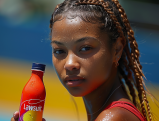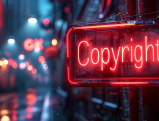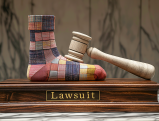
by Jonathan Schmig
June 3, 2015
These days, the name of Washington D.C.’s professional football team is generally viewed as offensive and in need of change. It is quite difficult to find someone (who is not affiliated with the team) who can put forth a colorable argument as to why the name is fine, and legally valid. Popular opinion seems to have effectively swung so far to the “offensive” camp that everyone—fan of football or not, Native American or not—wants to see the name changed.
Which is why one local Washington D.C. resident has been wagering, and hoping, that the team will soon decide to change its name to one he has the trademark rights to. Philip Martin McCaulay is a fifty-six-year-old actuary for the Department of Energy, and a part-time writer who has published more than seventy books, most of which are study guides or professional exam instructions. He has also recently been indulging in a rather curious hobby: trademark squatting.
Trademark squatting is when you knowingly register a trademark that a company will want or need, and then sell that company the rights for a profit. “Pure” trademark squatting is not really allowed—it violates the “good faith” requirement for a valid trademark, and amounts to extortion—but then that’s not always easy to prove, nor is it quite what is happening with McCaulay in Washington D.C. A “real” squatter would buy rights in a mark that already exists in some form. For example, if a famous Japanese company hadn’t yet registered or used their name in the U.S., and a U.S. citizen registered that name here, despite never using it or doing business with it, and then sold the Japanese company the name when they tried to enter the U.S. market.
Conversely, McCaulay is buying up rights in hypothetical team names that the Washington D.C. football team might be interested in, should they change their name. It’s a fascinating approach, especially considering that one of the names he has registered is the “Pandas” (presumably banking on the fact that the D.C. zoo is one of the few American zoos to house the Giant Panda—hey, it worked for the Bengals).
To date, there are at least sixteen different team names for which McCaulay has either obtained or sought trademark rights, including the Generals, the Red-Tailed Hawks, the Tribe, the Sharks, and the Gladiators. Some—like the “Original Americans” (too similar to the Original Americans Foundation, a nonprofit owned by the football team) and the “Senators” (in which the Washington Nationals baseball team owns rights)—have been money pits for McCaulay, and ultimate failures. Others—like the Bravehearts and the Americans—are among the “better” ones that he thinks are more likely to be “selected.” In fact, the website that McCaulay uses to operate all of these potential team names is “washingtonamericansfootball.com.”
The trademark squatting phenomenon isn’t quite as widespread in the U.S. as it is in some other countries around the world. Most countries have a registration-based trademark system—one in which the first to register the mark gets the rights. So it’s much easier in a registration-based system to simply apply for a mark you know or think a company will need, and then sell it to them when they need it at a huge mark-up. China has a big trademark squatting problem. In 2012, for instance, Apple had to fork over a reported $60M to a local company in order to use its “iPad” name in the People’s Republic.
The U.S., meanwhile (as well as a few other countries, like Australia and Canada—though even Canada may be changing its tune), employs a use-based system: rights in the mark emerge through use, not registration. Here, you can use a mark without ever having registered it, and you’ll still be the mark’s valid owner. Registration grants benefits, such as national priority and putting everyone on notice that you have it, but technically speaking it’s not required.
That means that anyone who wishes to be a “trademark squatter” here must not only register the mark, but must use it in commerce. McCaulay has been doing that. Not only are the marks proudly displayed on the website, but they also have been affixed to a variety of merchandise that are for sale on the website. Such merchandise includes t-shirts, miniature footballs, foam fingers, coasters, beer and wine glasses, bumper stickers, calendars, tote bags, coffee mugs, hats, and shoes. He’s even made some trading cards for the Washington Americans, with his own name and picture on the front and some stats on the back.
Trademark applications alone can cost a person several hundred dollars. Multiple that by the amount of marks McCaulay has sought protection for, and add to all that the shirts and mugs and footballs and hats he has ordered and customized… And one can understand how he’s already managed to spend more than $20,000 on this hobby. Thousands of dollars for merchandise on hypothetical, fictional teams.
And he’s not done. McCaulay searches the internet daily for fan discussions about new D.C. football team names, and he monitors the statuses of his registrations closely to watch out for competition. While McCaulay has not disclosed how much merchandise he’s sold so far (or whether he’s sold any), evidently that’s not even his main concern. “The only way I’ll turn a profit is if the Washington Redskins or the NFL needs to buy one of my trademarks,” he said. So he’s “not really interested in making money selling [his] products.”
Opine on that philosophy as you will, but, legally speaking, sales of merchandise is important. Merely making available some products for sale isn’t enough, nor is selling a single mug or hat a year, if you’re trying to shake down an entity as powerful as the Washington Redskins, or better yet the National Football League. If either one of them actually does want to use the mark “Americans,” or “Bravehearts,” or “Pandas,” McCaulay will probably have to be able to show some not-insignificant sales—and will probably have to find himself a good lawyer, too.
McCaulay says he’s never consulted a trademark attorney, but apparently he doesn’t disagree that the battle would be a tough one if either Snyder or the NFL did in fact want one of his team names. “I know it’s a long shot. I know it’s a high-risk investment. I’m just trying.”
But the Washington D.C. professional football team has bigger fish to fry for the moment. The team is embroiled in a lengthy trademark dispute (the latest battle in a now-decades-old war) over whether the term “Redskin” is offensive and, by extension, legally void.
The Redskins first registered their mark back in 1967. In the late ‘90s, the U.S. Patent and Trademark Office (USPTO) voted to cancel the mark, but the decision was overturned in 2003 by a court ruling that rested largely on the legal theory of laches: essentially, the plaintiffs in that case waited too long (after discovering the allegedly offensive mark) to bring suit. The guidance in that opinion said that the plaintiffs should have brought their case closer to when the trademark was originally registered—that is, the ‘60s and ‘70s. But the implication of that guidance was that a younger plaintiff, who would not have been able to assert any claim of cancellation until recently, may yet prevail in a cancellation suit such as this.
And so, that’s exactly what happened, and another case was brought by a different plaintiff. And in June 2014, the USPTO once again voted to cancel the Washington Redskins trademark, again on the basis that the mark is “disparaging” and offensive to Native Americans. As expected, the Redskins appealed the decision a few months later, so we will have to wait and see if this one, too, is overturned.
Regardless, the mere cancellation of the mark is largely a symbolic victory. It does not force the Redskins or Snyder or the NFL to stop using the mark, or to stop selling merchandise with the mark on it. But it does open the door for counterfeiters and third parties to legally use the mark, and it weakens the team’s ability to protect itself from infringers.
Moreover—perhaps most importantly—the decision reflects something of a “changing of the guard,” a truly vocal and powerful cultural shift, one that makes sportscasters and analysts and fans alike a bit uncomfortable and embarrassed whenever the name is mentioned.
The cancellation further reflects a growing concern that Dan Snyder may be out of touch in his steadfast refusal to even entertain the possibility of a name change. Dave Zirin wrote an excellent piece on Grantland in 2013 about the need for a change, citing among others one particular quote in which Snyder announced, “We’ll never change the name. It’s that simple. NEVER—you can use caps.” Bill Simmons is also on the list of influential sports writers who have taken to boycotting the name.
The Daily Show aired a segment in September 2014 wherein reporter Jason Jones confronted a variety of die hard Washington Redskins fans, and one of the ultimate conclusions the segment rested on was that the fans, ostensibly committed to the name though they were, admitted that they would continue rooting for the team even if the name changed. In the same month, South Park, in its infamously ruthless way, opened its 18th season with an episode specifically about the Redskins trademark pull. John Oliver (former Daily Show correspondent, and current host of HBO’s Last Week Tonight) aired a segment a few months earlier, noting in particular the ubiquity of popular opinion away from the “Redskins” name.
These instances of pop culture may perhaps be anecdotal, but the nerve they’re striking doesn’t seem to be. The success of those articles, segments, and episodes wouldn’t exist without general popular opinion already thinking likewise. Meanwhile one would be extremely hard-pressed to find anyone in support of Snyder’s camp, beyond (for the moment, at least) NFL Commissioner Roger Goodell. Snyder argues that the name is not offensive—rather it is “respectful”—and that the team’s use of the name is an important interest to take account of, specifically that forced removal of the name would constitute a 5th Amendment taking of (intellectual) property.
Of course, if the appeals court upholds the TTAB decision to cancel the mark, then that might finally be enough to convince Snyder of the desirability of change after all. And if that happens, then maybe—just maybe—he will come to McCaulay and cut a deal, and fans of the D.C. area will soon get to gather around on Sunday and cheer on the Pandas.
Topics: Trademarks










